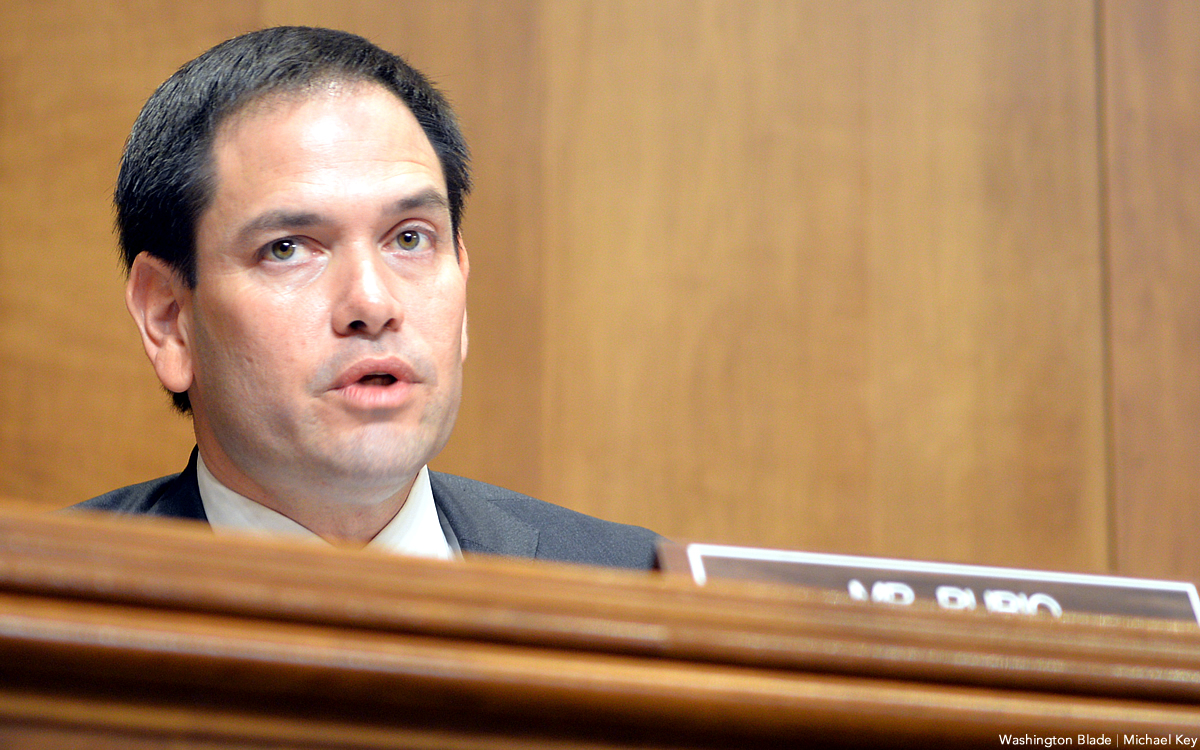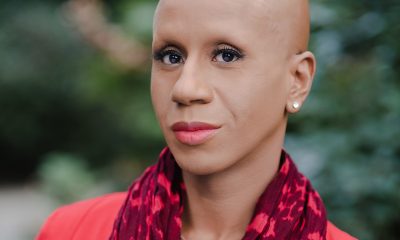News
Marco Rubio: Same-sex marriage bill ‘a stupid waste of time’
Schumer signals plan to bring measure to Senate floor

Sen. Marco Rubio (R-Fla.) left no question Wednesday about where he stands on legislation to codify same-sex marriage, telling reporters the measure is a “stupid waste of time.”
“That bill’s not important. It’s a waste of our time on a non issue,” Rubio said, according to Business Insider’s Bryan Metzger. “But I know plenty of gay people in Florida that are pissed off about gas prices.”
Rubio’s remarks are consistent with his comment in previous years in opposition to same-sex marriage. As a presidential candidate in 2015, Rubio said the U.S. Supreme Court’s 2015 ruling in Obergefell v. Hodges is “not settled law” and compared the decision to Roe v. Wade, which justices recently overturned in the Dobbs decision.
The Florida Republican was asked his views on the Respect for Marriage Act, which the House approved Tuesday on a bipartisan basis in an effort to protect same-sex marriage after the ruling in the Dobbs case, as reporters on Capitol Hill sought to determine whether sufficient GOP support exists in the Senate to end a filibuster.
Senate Majority Leader Charles Schumer (D-N.Y.) said on the Senate floor Wednesday he was counting votes and plans to bring the measure to a floor vote.
Sen. Mitt Romney (R-Utah), now a critic of former President Trump but formerly a champion of a proposed constitutional amendment that would have banned same-sex marriage nationwide, said the House bill was “unnecessary,” according to Politico’s Burgess Everett.
“I haven’t given consideration to that legislation, in part because the law isn’t changing and there’s no indication that it will,” Romney was quoted as saying.
“I was really impressed by how much bipartisan support it got in the House,” Schumer said, according to the Washington Post. “I want to bring this bill to the floor, and we’re working to get the necessary Senate Republican support to ensure it would pass.”
Republicans who signaled support for the legislation include Sen. Rob Portman (R-Ohio), who said he’d seek to co-sponsor the Senate version of the bill, and Sen. Thom Tillis (R-N.C.), who told reporters he “probably will” vote for it.
One Democratic holdout may be Sen. Joe Manchin (D-W.Va.), who once had the distinction of being the only member of the Senate Democratic caucus not to have come out in favor of same-sex marriage.
Manchin, however, signaled general support for the Respect for Marriage Act when asked Wednesday about the legislation, according to CNN’s Manu Raju.
“I haven’t seen the final print but I don’t have a problem,” Manchin was quoted as saying.
The White House
Jane Rigby awarded Presidential Medal of Freedom

Sitting among a diverse and venerable group of Americans from every walk of life on the dais in the East Room of the White House on May 3 was lesbian and NASA astrophysicist Jane Rigby, awaiting her turn to be honored by President Joe Biden who would bestow the Presidential Medal of Freedom, the nation’s highest civilian honor, on her.
Rigby, an astronomer who grew up in Delaware, is the chief scientist of the world’s most powerful telescope who alongside her team operating NASA’s James Webb Space Telescope, studies every phase in the history of the universe, ranging from the first luminous glows after the Big Bang, to the formation of solar systems capable of supporting life on planets like Earth, to the evolution of the solar system.
A member of Penn State’s Class of 2000, Rigby graduated with a bachelor’s degrees in physics and astronomy. She also holds a master’s degree and a PhD in astronomy from at the University of Arizona. Her work as the senior project scientist for NASA’s Webb Telescope includes studies on how galaxies evolve over cosmic time and she has published more than 140 peer-reviewed scientific papers.
Rigby was named to Nature.com’s 2022 list of 10 individuals who shaped science and to the BBC’s list of 100 inspiring and influential women in the same year. Rigby had postdoctoral fellowships at Carnegie Observatories in Pasadena, Calif., before landing her job at Goddard Space Flight Center. In 2013 Rigby was awarded the Robert H. Goddard Award for Exceptional Achievement for Science.
A founding member of the American Astronomical Society’s Working Group on LGBTQ Equality in January 2012, now called the Committee for Sexual Orientation and Gender Minorities in Astronomy, Rigby serves as its Board Liaison until her term expires this June.
The lesbian astrophysicist in an interview for SGMA’s website spoke about her experiences including coming out:
“I’ve been out since 2000. My story’s simple — I fell in love with a fellow grad student in the department. It was a close-knit department, so hiding would have been ludicrous. Nor did I want to hide the best thing in my life! So, we were out as grad students. I certainly heard people say awful homophobic things at work there. They weren’t directed at me, and they weren’t said by people with power over me. If I recall, I was much less afraid of homophobic discrimination at work, than I was afraid of the two-body problem, and the lack of support we would receive as a same-sex couple in astronomy. That fear turned out to be justified. I’ve seen numerous different-sex couples get a wide range of support in solving the two-body problem, which was never offered to us,” she told the interviewer.
She reflected on American astronaut and physicist Sally Ride, her childhood role model who had an impact on her career:
“One of my biggest role models when I was young was Dr. Sally Ride. A few years ago, on her deathbed, Dr. Ride chose to write in her obituary that her life partner had been a woman. Dr. Ride was the most influential woman scientist when I was growing up — the person that made me say, “I want to do THAT when I grow up.” It was because of her that I realized that astrophysics was a profession, that physics was a subject girls could study, that NASA needed astrophysicists. So I’m so … amused, I suppose, that Sally Ride was this influence on my life’s path, at a time when I was completely unaware that it was even possible to *be gay* — and at the same time, she was gay, in love, and deeply closeted to keep her job.”
The interviewer noted that “for some women being gay is a cause for concern at the work place. Some say they were unsure about how to turn their sexual orientation into a positive aspect of their work persona.” Then asked Rigby what is your view on this?
“My experience is that absolutely I am a *better* astronomer because I’m queer. For a few reasons. First, I see things different than my colleagues. On mission work, as we weigh a decision, my first thought is always the community impact: ‘If we do things this way, who benefits, and who gets left out in the cold?’ Will this policy create inclusion, or marginalization? I think about science in terms of community-building. What team do we need to tackle a given science problem, with skills that are different from mine? Absolutely I think that way because I’m an outsider, because I’ve been marginalized. And because community-building is central to LGBTQ culture,” she said.
Editor’s note: You can read Rigby’s complete SGMA interview here: (Link)
Married to Dr. Andrea Leistra, Rigby, her wife and their young child reside in Maryland not far from her workplace at the NASA Goddard Space Flight Center in suburban Washington and when not studying the universe is often found on the neighboring Chesapeake Bay wind boarding, a favored pastime.
Also honored in the ceremony Friday were a former U.S. vice president, a civil rights worker and martyr, two former Cabinet secretaries — one a former U.S. secretary of state, a speech writer for the late Dr. Martin Luther King Jr., an Olympian and gold medalist, and one of the most powerful woman political leaders and the speaker emeritus of the U.S. House of Representatives, among others, and LGBTQ advocate Judy Shepard.
WATCH
Arts & Entertainment
Washington Blade’s Pride on the Pier and fireworks show returning June 8
The annual Pride on the Pier Fireworks Show presented by the Leonard-Litz Foundation will take place on Saturday, June 8 at 9 p.m.

The Washington Blade, in partnership with LURe DC and The Wharf, is excited to announce the 5th annual Pride on the Pier and fireworks show during D.C. Pride weekend on Saturday, June 8, 2024, from 2-10 p.m.
The event will include the annual Pride on the Pier Fireworks Show presented by the Leonard-Litz Foundation at 9 p.m.

Pride on the Pier extends the city’s annual celebration of LGBTQ visibility to the bustling Southwest waterfront with an exciting array of activities and entertainment for all ages. The District Pier will offer DJs, dancing, drag, and other entertainment. Alcoholic beverages will be available for purchase for those 21 and older. Local DJ’s Heat, Eletrox and Honey will perform throughout the event.
3 p.m. – Capital Pride Parade on the Big Screen
3:30 p.m. – Drag Show hosted by Cake Pop!
9 p.m. – Fireworks Show Presented by Leonard-Litz Foundation

The event is free and open to the public. The Dockmasters Building will be home to a VIP experience. To learn more and to purchase tickets go to www.prideonthepier.com/vip. VIP tickets are limited.
Event sponsors include Absolut, Buying Time, Capital Pride, DC Brau, DC Fray, Burney Wealth Management, Infinate Legacy, Leonard-Litz Foundation, Mayor’s Office of LGBTQ Affairs, MISTR, NBC4, The Wharf. More information regarding activities will be released at www.PrideOnThePier.com
Maryland
Trone discusses transgender niece
Blade interviewed Md. congressman, Angela Alsobrooks last week

Editor’s note: The Washington Blade last week interviewed both U.S. Rep. David Trone (D-Md.) and Prince George’s County Executive Angela Alsobrooks. The full interviews with both Democratic candidates for retiring U.S. Sen. Ben Cardin (D-Md.)’s seat will be on the Blade’s website later this week.
Maryland Congressman David Trone last week discussed his transgender niece during an interview with the Washington Blade about his U.S. Senate campaign.
Trone, who is running to succeed retiring U.S. Sen. Ben Cardin (D-Md.), on May 1 told the Blade during a telephone interview that his niece transitioned when she was in her early 20s. Trone also noted she attended Furman University, a small, liberal arts university in Greenville, S.C.
“I was concerned about how she would be able to transition there,” said Trone.
Trone, who founded Total Wine & More, attended Furman University as an undergrad and is on the school’s board of trustees. Trone told the Blade he donated $10 million to the university to “build out their mental health capacity, which I felt was a way that she could have the best mental health care possible when she worked her way through (her) transition.”
Trone’s niece graduated from the university after she spent five years there.
“She had a great relationship with Furman,” said Trone.
Trone and Prince George’s County Executive Angela Alsobrooks are the leading Democrats running to succeed Cardin. The winner of the May 14 Democratic primary will face former Maryland Gov. Larry Hogan in November.




















